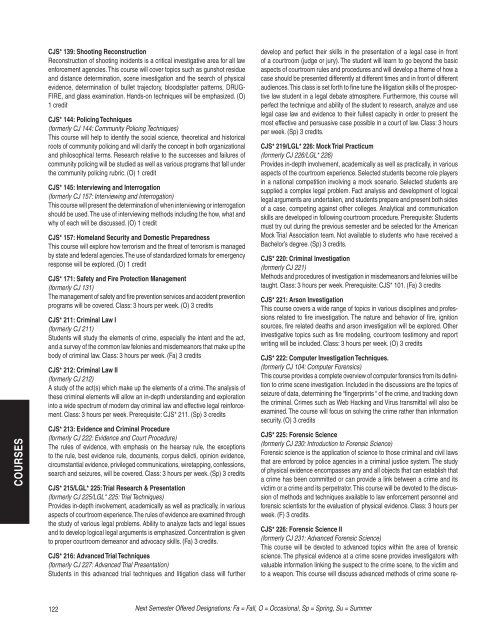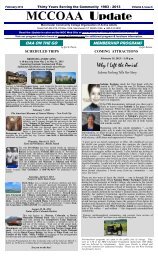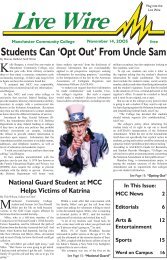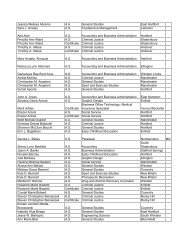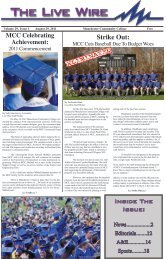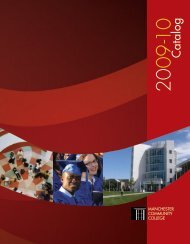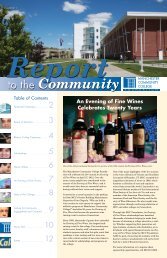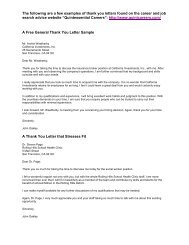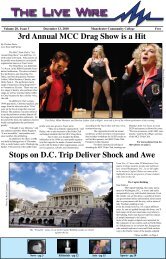Liberal Arts and Science - Manchester Community College ...
Liberal Arts and Science - Manchester Community College ...
Liberal Arts and Science - Manchester Community College ...
You also want an ePaper? Increase the reach of your titles
YUMPU automatically turns print PDFs into web optimized ePapers that Google loves.
COURSES<br />
CJS* 139: Shooting Reconstruction<br />
Reconstruction of shooting incidents is a critical investigative area for all law<br />
enforcement agencies. This course will cover topics such as gunshot residue<br />
<strong>and</strong> distance determination, scene investigation <strong>and</strong> the search of physical<br />
evidence, determination of bullet trajectory, bloodsplatter patterns, DRUG-<br />
FIRE, <strong>and</strong> glass examination. H<strong>and</strong>s-on techniques will be emphasized. (O)<br />
1 credit<br />
CJS* 144: Policing Techniques<br />
(formerly CJ 144: <strong>Community</strong> Policing Techniques)<br />
This course will help to identify the social science, theoretical <strong>and</strong> historical<br />
roots of community policing <strong>and</strong> will clarify the concept in both organizational<br />
<strong>and</strong> philosophical terms. Research relative to the successes <strong>and</strong> failures of<br />
community policing will be studied as well as various programs that fall under<br />
the community policing rubric. (O) 1 credit<br />
CJS* 145: Interviewing <strong>and</strong> Interrogation<br />
(formerly CJ 157: Interviewing <strong>and</strong> Interrogation)<br />
This course will present the determination of when interviewing or interrogation<br />
should be used. The use of interviewing methods including the how, what <strong>and</strong><br />
why of each will be discussed. (O) 1 credit<br />
CJS* 157: Homel<strong>and</strong> Security <strong>and</strong> Domestic Preparedness<br />
This course will explore how terrorism <strong>and</strong> the threat of terrorism is managed<br />
by state <strong>and</strong> federal agencies. The use of st<strong>and</strong>ardized formats for emergency<br />
response will be explored. (O) 1 credit<br />
CJS* 171: Safety <strong>and</strong> Fire Protection Management<br />
(formerly CJ 131)<br />
The management of safety <strong>and</strong> fire prevention services <strong>and</strong> accident prevention<br />
programs will be covered. Class: 3 hours per week. (O) 3 credits<br />
CJS* 211: Criminal Law I<br />
(formerly CJ 211)<br />
Students will study the elements of crime, especially the intent <strong>and</strong> the act,<br />
<strong>and</strong> a survey of the common law felonies <strong>and</strong> misdemeanors that make up the<br />
body of criminal law. Class: 3 hours per week. (Fa) 3 credits<br />
CJS* 212: Criminal Law II<br />
(formerly CJ 212)<br />
A study of the act(s) which make up the elements of a crime. The analysis of<br />
these criminal elements will allow an in-depth underst<strong>and</strong>ing <strong>and</strong> exploration<br />
into a wide spectrum of modern day criminal law <strong>and</strong> effective legal reinforcement.<br />
Class: 3 hours per week. Prerequisite: CJS* 211. (Sp) 3 credits<br />
CJS* 213: Evidence <strong>and</strong> Criminal Procedure<br />
(formerly CJ 222: Evidence <strong>and</strong> Court Procedure)<br />
The rules of evidence, with emphasis on the hearsay rule, the exceptions<br />
to the rule, best evidence rule, documents, corpus delicti, opinion evidence,<br />
circumstantial evidence, privileged communications, wiretapping, confessions,<br />
search <strong>and</strong> seizures, will be covered. Class: 3 hours per week. (Sp) 3 credits<br />
CJS* 215/LGL* 225: Trial Research & Presentation<br />
(formerly CJ 225/LGL* 225: Trial Techniques)<br />
Provides in-depth involvement, academically as well as practically, in various<br />
aspects of courtroom experience. The rules of evidence are examined through<br />
the study of various legal problems. Ability to analyze facts <strong>and</strong> legal issues<br />
<strong>and</strong> to develop logical legal arguments is emphasized. Concentration is given<br />
to proper courtroom demeanor <strong>and</strong> advocacy skills. (Fa) 3 credits.<br />
CJS* 216: Advanced Trial Techniques<br />
(formerly CJ 227: Advanced Trial Presentation)<br />
Students in this advanced trial techniques <strong>and</strong> litigation class will further<br />
122<br />
develop <strong>and</strong> perfect their skills in the presentation of a legal case in front<br />
of a courtroom (judge or jury). The student will learn to go beyond the basic<br />
aspects of courtroom rules <strong>and</strong> procedures <strong>and</strong> will develop a theme of how a<br />
case should be presented differently at different times <strong>and</strong> in front of different<br />
audiences. This class is set forth to fine tune the litigation skills of the prospective<br />
law student in a legal debate atmosphere. Furthermore, this course will<br />
perfect the technique <strong>and</strong> ability of the student to research, analyze <strong>and</strong> use<br />
legal case law <strong>and</strong> evidence to their fullest capacity in order to present the<br />
most effective <strong>and</strong> persuasive case possible in a court of law. Class: 3 hours<br />
per week. (Sp) 3 credits.<br />
CJS* 219/LGL* 226: Mock Trial Practicum<br />
(formerly CJ 226/LGL* 226)<br />
Provides in-depth involvement, academically as well as practically, in various<br />
aspects of the courtroom experience. Selected students become role players<br />
in a national competition involving a mock scenario. Selected students are<br />
supplied a complex legal problem. Fact analysis <strong>and</strong> development of logical<br />
legal arguments are undertaken, <strong>and</strong> students prepare <strong>and</strong> present both sides<br />
of a case, competing against other colleges. Analytical <strong>and</strong> communication<br />
skills are developed in following courtroom procedure. Prerequisite: Students<br />
must try out during the previous semester <strong>and</strong> be selected for the American<br />
Mock Trial Association team. Not available to students who have received a<br />
Bachelor’s degree. (Sp) 3 credits.<br />
CJS* 220: Criminal Investigation<br />
(formerly CJ 221)<br />
Methods <strong>and</strong> procedures of investigation in misdemeanors <strong>and</strong> felonies will be<br />
taught. Class: 3 hours per week. Prerequisite: CJS* 101. (Fa) 3 credits<br />
CJS* 221: Arson Investigation<br />
This course covers a wide range of topics in various disciplines <strong>and</strong> professions<br />
related to fire investigation. The nature <strong>and</strong> behavior of fire, ignition<br />
sources, fire related deaths <strong>and</strong> arson investigation will be explored. Other<br />
investigative topics such as fire modeling, courtroom testimony <strong>and</strong> report<br />
writing will be included. Class: 3 hours per week. (O) 3 credits<br />
CJS* 222: Computer Investigation Techniques.<br />
(formerly CJ 104: Computer Forensics)<br />
This course provides a complete overview of computer forensics from its definition<br />
to crime scene investigation. Included in the discussions are the topics of<br />
seizure of data, determining the “fingerprints “ of the crime, <strong>and</strong> tracking down<br />
the criminal. Crimes such as Web Hacking <strong>and</strong> Virus transmittal will also be<br />
examined. The course will focus on solving the crime rather than information<br />
security. (O) 3 credits<br />
CJS* 225: Forensic <strong>Science</strong><br />
(formerly CJ 230: Introduction to Forensic <strong>Science</strong>)<br />
Forensic science is the application of science to those criminal <strong>and</strong> civil laws<br />
that are enforced by police agencies in a criminal justice system. The study<br />
of physical evidence encompasses any <strong>and</strong> all objects that can establish that<br />
a crime has been committed or can provide a link between a crime <strong>and</strong> its<br />
victim or a crime <strong>and</strong> its perpetrator. This course will be devoted to the discussion<br />
of methods <strong>and</strong> techniques available to law enforcement personnel <strong>and</strong><br />
forensic scientists for the evaluation of physical evidence. Class: 3 hours per<br />
week. (F) 3 credits.<br />
CJS* 226: Forensic <strong>Science</strong> II<br />
(formerly CJ 231: Advanced Forensic <strong>Science</strong>)<br />
This course will be devoted to advanced topics within the area of forensic<br />
science. The physical evidence at a crime scene provides investigators with<br />
valuable information linking the suspect to the crime scene, to the victim <strong>and</strong><br />
to a weapon. This course will discuss advanced methods of crime scene re-<br />
Next Semester Offered Designations: Fa = Fall, O = Occasional, Sp = Spring, Su = Summer


